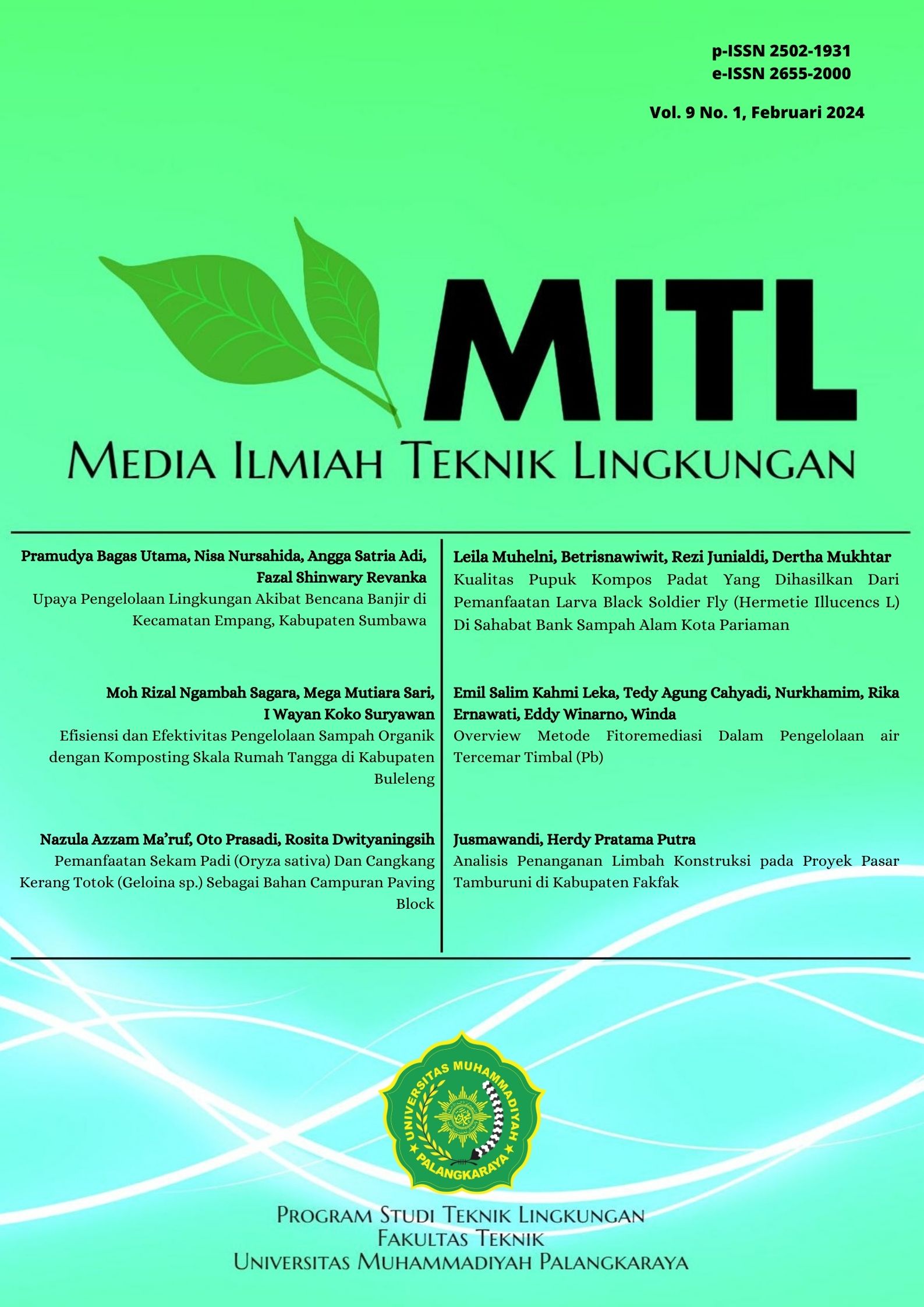Efisiensi dan Efektivitas Pengelolaan Sampah Organik dengan Komposting Skala Rumah Tangga di Kabupaten Buleleng Efficiency and Effectiveness of Organic Waste Management with Household Scale Composting in Buleleng Regency
Main Article Content
Abstract
This study focuses on the analysis of domestic waste management in Buleleng Regency based on data from the National Waste Management Information System (SIPSN) managed by the Ministry of Environment and Forestry. The background of this study is grounded on the necessity to comprehend the basic characteristics of waste in Buleleng and its challenges and solutions. Employing descriptive analysis and literature study methods, this research successfully maps the composition, quantity, and waste management methods in the regency. Results indicate that the composition of domestic waste is dominated by specific types and, compared to other urban areas in Indonesia, there are distinct characteristics in waste management in Buleleng. A brief conclusion from this study emphasizes the need for a more integrated and sustainable waste management strategy in Buleleng Regency.
Downloads
Article Details

This work is licensed under a Creative Commons Attribution-ShareAlike 4.0 International License.
All rights reserved. This publication may be reproduced, stored in a retrieval system, or transmitted in any form or by any means, electronic, mechanical, photocopying, recording.
References
I. W. K. Suryawan and C.-H. Lee, “Citizens’ willingness to pay for adaptive municipal solid waste management services in Jakarta, Indonesia,” Sustain. Cities Soc., vol. 97, 2023, doi: https://doi.org/10.1016/j.scs.2023.104765.
M. M. Sari et al., “Prediction of recovery energy from ultimate analysis of waste generation in Depok City, Indonesia,” Int. J. Electr. Comput. Eng., vol. 13, no. 1, p. 1, 2023, doi: 10.11591/ijece.v13i1.pp1-8.
M. M. Sari et al., “Comparison of Solid Waste Generation During and Before Pandemic Covid-19 in Indonesia Border Island (Riau Islands Province, Indonesia),” Ecol. Eng. Environ. Technol., vol. 24, no. 2, pp. 251–260, 2023, doi: 10.12912/27197050/157170.
I. Y. Septiariva and I. W. K. Suryawan, “The Effect of the COVID-19 Pandemic on Waste Management in the Eastern Tourism Regions of Java and Bali Islands,” Ecol. Eng. Environ. Technol., vol. 24, no. 3, pp. 1–9, 2023, [Online]. Available: http://www.ecoeet.com/The-Effect-of-the-COVID-19-Pandemic-on-Waste-Management-in-the-Eastern-Tourism-Regions,159430,0,2.html
S. M. P. Lestari, L. Fitria, and H. Sutrisno, “Perancangan Tempat Pengolahan Sampah (TPS) 3R di Kelurahan Sungai Jawi Dalam Kota Pontianak,” J. Teknol. Lingkung. Lahan Basah, vol. 9, no. 2, p. 062, 2021, doi: 10.26418/jtllb.v9i2.47646.
T. N. Pramestyawati and I. Warmadewanthi, “Potensi Reduksi Sampah terhadap Penurunan Timbulan Gas Rumah Kaca di Tempat Pemrosesan Akhir (TPA) Kota Madiun,” J. Tek. Pomits, vol. 2, no. 2, pp. 74–77, 2013.
I. W. K. Suryawan, A. Rahman, I. Y. Septiariva, S. Suhardono, and I. M. W. Wijaya, “Life Cycle Assessment of Solid Waste Generation During and Before Pandemic of Covid-19 in Bali Province,” J. Sustain. Sci. Manag., vol. 16, no. 1, pp. 11–21, 2021, doi: 10.46754/jssm.2021.01.002.
I. M. W. Widyarsana, E. Damanhuri, and E. Agustina, “Municipal solid waste material flow in Bali Province, Indonesia,” J. Mater. Cycles Waste Manag., vol. 22, no. 2, pp. 405–415, 2020, doi: 10.1007/s10163-020-00989-5.
D. I. Mustia, S. Edy, and A. Nurul, “Analysis of waste composition as a source of refuse-derived fuel in Cilacap,” IOP Conf. Ser. Earth Environ. Sci., vol. 896, no. 1, p. 12063, 2021, doi: 10.1088/1755-1315/896/1/012063.
S. D. A. Smith and E. Bernal, “Quantifying mismanaged waste in a small Balinese coastal village: Comparisons of standing stock in different habitats,” Ocean Coast. Manag., vol. 202, p. 105433, 2021, doi: https://doi.org/10.1016/j.ocecoaman.2020.105433.
S. R. I. Wahyono, F. L. Sahwan, F. Suryanto, I. Febriyanto, and R. Nugroho, “Study of Characterization of Landfill Based Municipal Solid Waste and Its Potential Utilization (Case Study at Sukawinatan and Bantargebang Landfill ),” J. Teknol. Lingkung., vol. 20, no. 2, pp. 179–188, 2019.
Kementerian Lingkungan Hidup dan Kehutanan, “Sistem informasi Pengelolaan Sampah Nasional,” 2021. http://sipsn.menlhk.go.id
C. Priefer, J. Jörissen, and K.-R. Bräutigam, “Food waste prevention in Europe – A cause-driven approach to identify the most relevant leverage points for action,” Resour. Conserv. Recycl., vol. 109, pp. 155–165, 2016, doi: https://doi.org/10.1016/j.resconrec.2016.03.004.
K. L. Thyberg and D. J. Tonjes, “Drivers of food waste and their implications for sustainable policy development,” Resour. Conserv. Recycl., vol. 106, pp. 110–123, 2016, doi: https://doi.org/10.1016/j.resconrec.2015.11.016.
H. Čičková, G. L. Newton, R. C. Lacy, and M. Kozánek, “The use of fly larvae for organic waste treatment,” Waste Manag., vol. 35, pp. 68–80, 2015, doi: https://doi.org/10.1016/j.wasman.2014.09.026.
H. I. Abdel-Shafy and M. S. M. Mansour, “Solid waste issue: Sources, composition, disposal, recycling, and valorization,” Egypt. J. Pet., vol. 27, no. 4, pp. 1275–1290, 2018, doi: https://doi.org/10.1016/j.ejpe.2018.07.003.
R. Salemdeeb, E. K. H. J. zu Ermgassen, M. H. Kim, A. Balmford, and A. Al-Tabbaa, “Environmental and health impacts of using food waste as animal feed: a comparative analysis of food waste management options,” J. Clean. Prod., vol. 140, pp. 871–880, 2017, doi: https://doi.org/10.1016/j.jclepro.2016.05.049.
N. Fadhillah and A. Y. Bagastyo, “Utilization of Hermetia illucens Larvae as A Bioconversion Agent to Reduce Organic Waste,” IOP Conf. Ser. Earth Environ. Sci., vol. 506, no. 1, 2020, doi: 10.1088/1755-1315/506/1/012005.
R. Raksasat et al., “Blended sewage sludge–palm kkernel expeller to enhance the palatability of black soldier fly larvae for biodiesel production,” Processes, vol. 9, no. 2, Feb. 2021, doi: 10.3390/pr9020297.
M. M. Sari, I. W. K. Suryawan, and I. Y. Septiariva, “Processing of Biodegradable Waste from Ceremonial Activities in Bali with Black Soldier Fly (BSF) Larvae,” J. Multidiscip. Appl. Nat. Sci., vol. 3, no. 2, pp. 138–148, 2023, doi: 10.47352/jmans.2774-3047.175.
I. W. Koko et al., “Effect of sludge sewage quality on heating value : case study in Jakarta , Indonesia,” Desalin. Water Treat., vol. 28071, pp. 1–8, 2022, doi: 10.5004/dwt.2022.28071.
